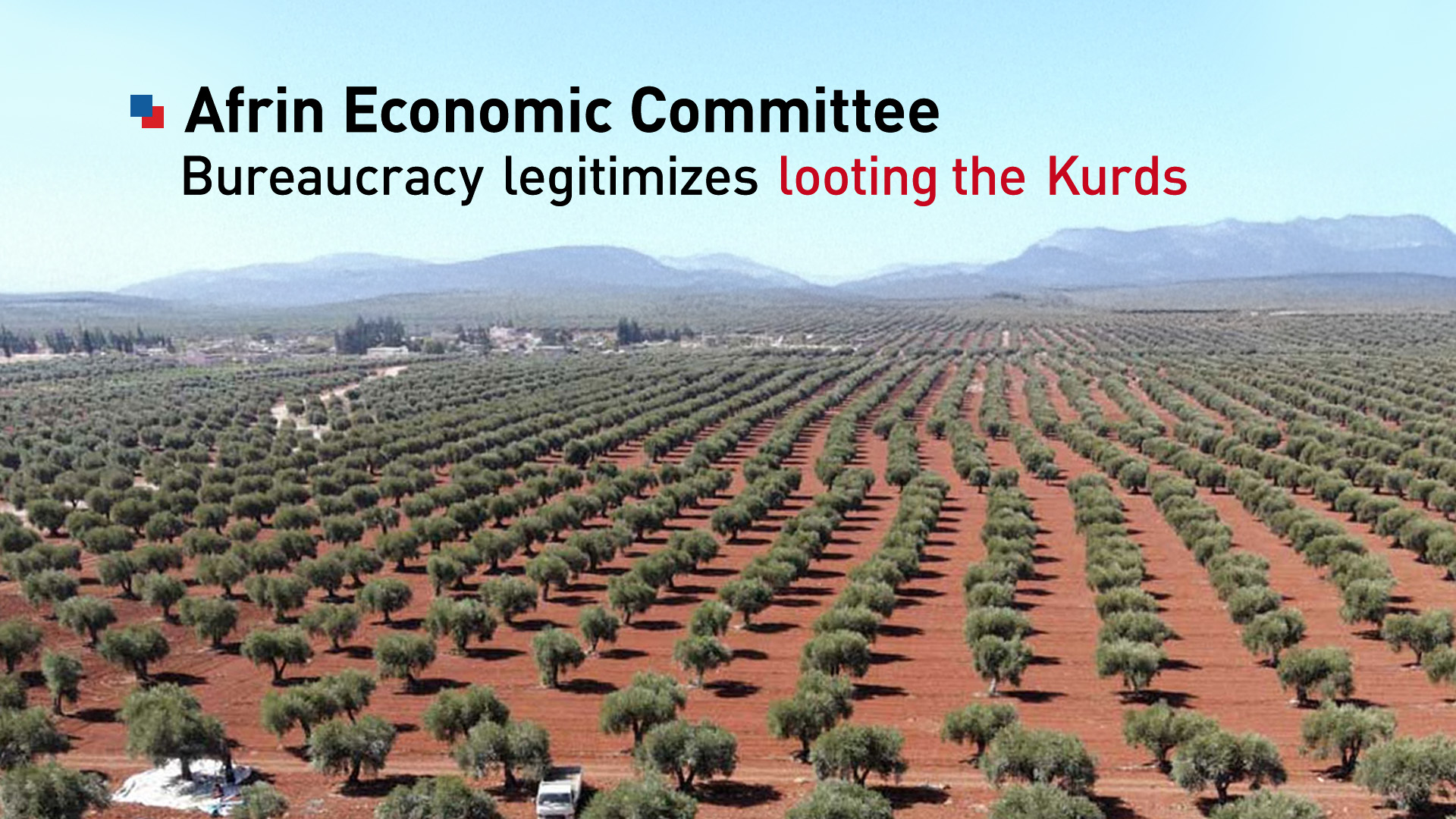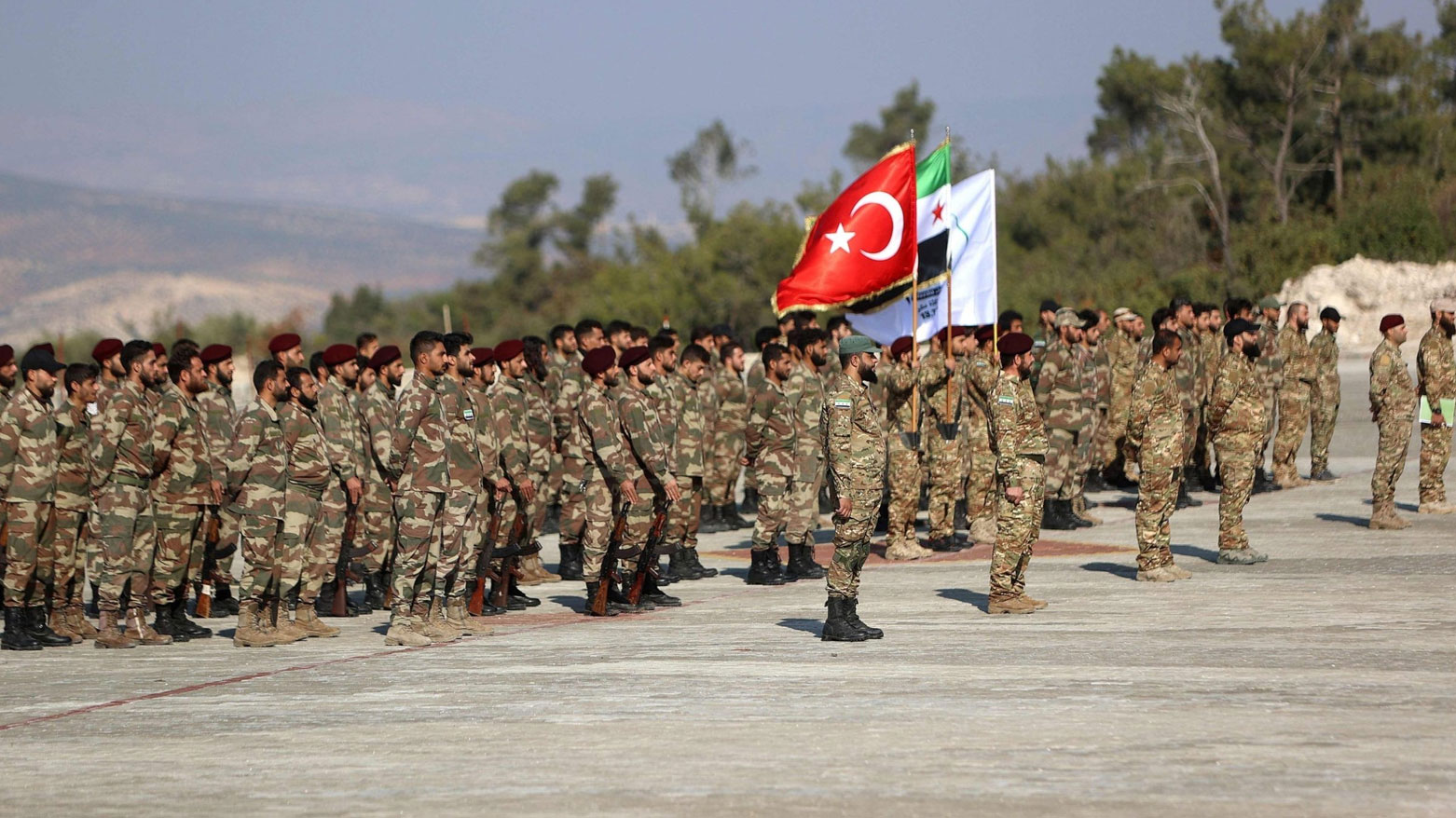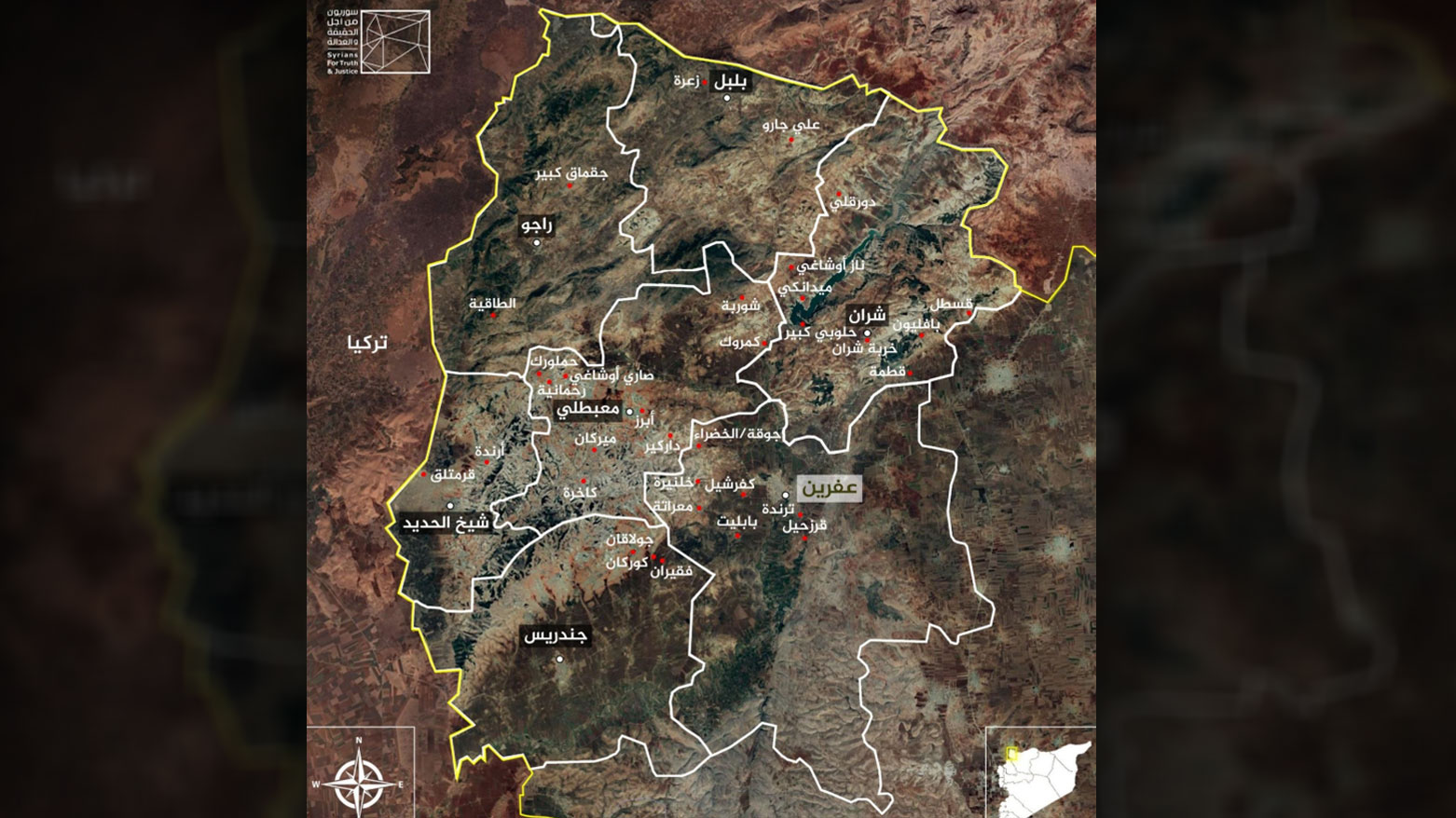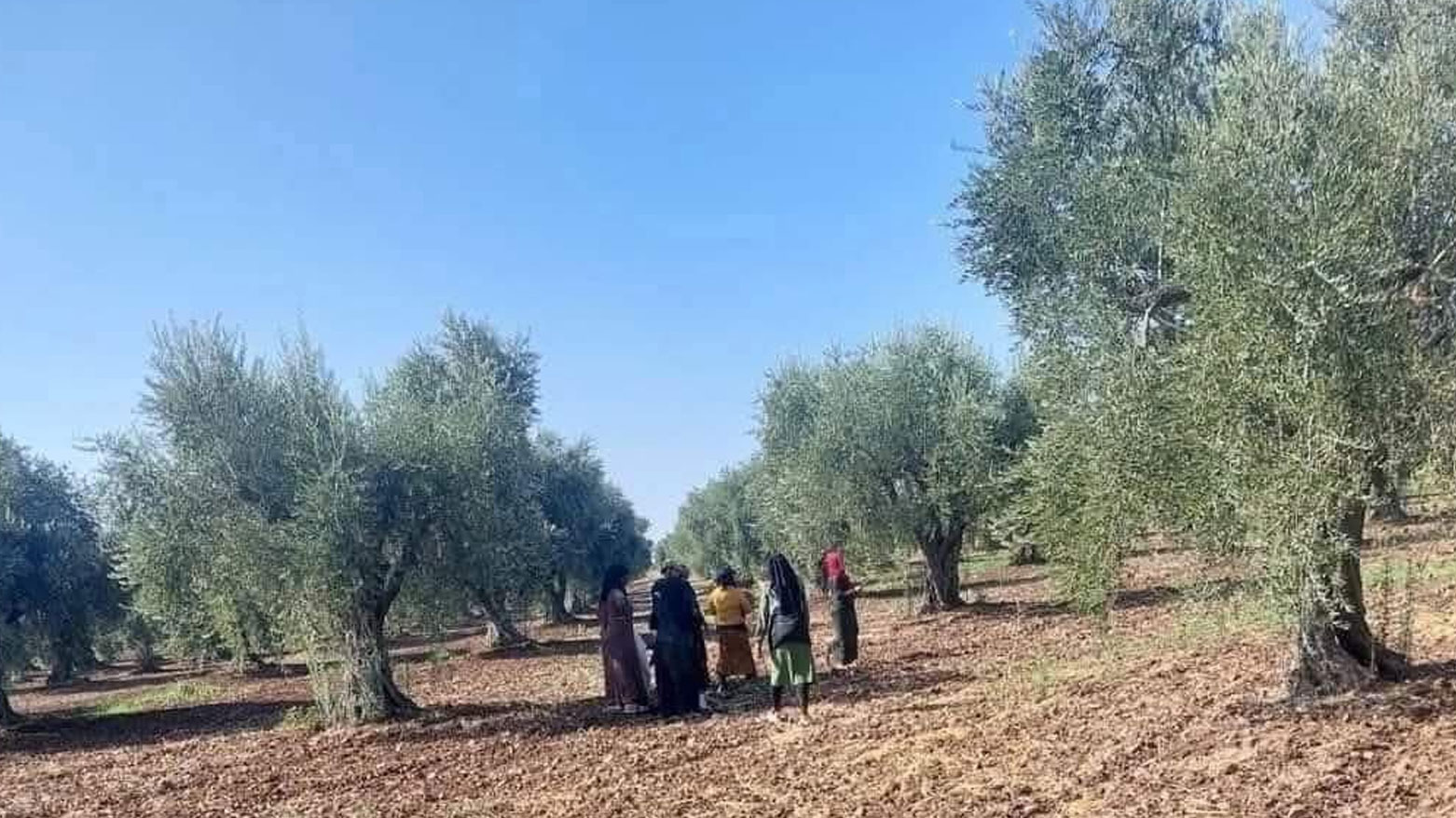The Economic Committee in Afrin: Bureaucracy or a Tool to Legitimize Looting?
The Economic Committee in Afrin is systematically preventing Kurdish farmers from harvesting their olives by imposing impossible documentation requirements, effectively seizing their property. Local sources confirm this committee, unique to Afrin and operates under National Army factions influence.

ERBIL (Kurdistan24) - The city of Afrin, located in Northwest Syria (Western Kurdistan), has witnessed significant security and military transformations since its occupation by Ankara-backed "National Army" factions. These factions later officially joined what is known as the Syrian Army, affiliated with the transitional government. This occupation was accompanied by a wide wave of forced displacement of thousands of indigenous people, civilian casualties, and serious violations of the basic rights of the population, including killings, arbitrary arrests, torture, and confiscation of property, amid systematic policies that have brought about a profound demographic change in the region.

The residents of Afrin had hoped that the fall of Bashar al-Assad's regime would open a new page of stability and lift the injustices they suffered. However, the reality that followed was completely the opposite, as local policies intertwined with the presence of armed factions and the complexities of administrative bureaucracy, together forming a network of daily restrictions and extortion that burdens the people, even in the simplest details of their lives, including their attempts to harvest their agricultural crops.
At the heart of this scene is the Economic Committee in Afrin, a local administrative body formed after the fall of the Assad regime and the seizure of power by the General Security apparatus of the transitional government from the factions that controlled the city in 2018. Since then, the committee has become the subject of widespread controversy among the residents and human rights organizations. It presents itself as an entity responsible for organizing economic and administrative affairs and studying requests to recover homes and lands seized by settlers, while residents accuse it of being a tool for control and appropriation of the property of displaced Kurds.
In an official effort to reclaim lands and homes, the Afrin region administration issued a statement specifying the conditions that returning Kurdish displaced persons must meet to recover their properties. The statement read:
"In the interest of the public and to ensure the rights of our fellow citizens, properties will be handed over immediately through the General Economic Office in Afrin or the branch offices in the sub-districts, according to the following conditions:
The real estate registration statement must be recent, not exceeding three months.
A copy of the personal ID of the citizen claiming the property.
In the event of the owner's death, a recent death certificate and family statement must be presented, with a certified authorization from the village's mukhtar and the fingerprints of two witnesses, or a valid official power of attorney from all heirs."
Although the conditions seem simple on paper, their application on the ground tells a different story. Many accuse the committee of being used as a cover for the seizure of the property of displaced Kurds who fled after the occupation of Afrin in 2018. This is done by imposing complex bureaucratic procedures and requiring official documents that are difficult to obtain after years of displacement. Activists assert that these measures are sometimes used as a means of pressure or restriction on the original inhabitants, as they are required to prove their official ownership of the land, and if they are unable to do so, half of their crops are confiscated for the benefit of the committee.

Kurdistan24 followed up and confirmed that this policy is indeed in effect, as journalist by the name Salih al-Faris, known as "Abu Sham," appeared in a video recording saying:
Of course, it's not as rumored that the Economic Committee takes half the harvest; this is only for unofficial powers of attorney. Anyone who brings an official power of attorney will receive their full harvest. Therefore, you must prepare your official papers."
This means that anyone who cannot provide official documents will have half of their land taken. According to Kurdistan24 sources, the majority of the lands in Afrin are inherited and were not registered in the names of the heirs due to the war in Syria.
For its part, the local administration justifies that the committee aims to "organize the economy, ensure transparency, and prevent conflicts." However, human rights organizations believe that its role has gone beyond the administrative framework to become a tool for establishing a new reality in Afrin, by changing ownership patterns and redistributing agricultural resources at the expense of the indigenous population.
Testimonies from the Field: Stories of Daily Suffering
In an interview with Kurdistan24, Ahmed Hassan, Head of the Kurdish National Council in Afrin, said:
"The situation in Afrin is still under the control of the remnants of the factions. The Economic Committee is subject to the influence of those factions, and it imposes taxes and royalties on the population and takes half of the olive season. It also requests impossible papers to prove ownership, and people suffer from threats, especially as the harvest season approaches."
He added:
"The situation is much more difficult than in other areas like Azaz, where there is no economic committee. In Afrin, they use this committee as a tool for pressure and extortion, which makes some unable to harvest their crops, while theft increases daily."

Kurdish Syrian parliament member Mohammed Seydo said on his Facebook page:
"What is happening in Afrin is regrettable, painful, and unacceptable under any name, as farmers are being deprived of their rights and their livelihoods are threatened under flimsy pretexts that have nothing to do with justice."
The parliamentarian continued:
"This injustice cannot be tolerated, as the absence of oversight and accountability opens the door to the exploitation of farmers and the looting of their rights. True justice lies in protecting people's rights, livelihoods, and property."
Seydo affirmed:
"We will not allow the theft of people's labor, and we will not be satisfied with injustice passing without accountability, and the affected must be compensated. The efforts made are appreciated but are not sufficient, and the efforts of the state and good people should be combined to preserve civil peace and protect property."
The Kurdistan Syria Front also issued a statement confirming that the economic offices in Afrin have "turned into an alternative authority to the judiciary," saying:
"The people who returned and paid taxes to recover their lands have been deprived of the right to harvest their crops this year, and that has become conditional on the exclusive approval of the economic offices."
After Kurdistan24 English follow-up and verification, of a circulated audio recordings in which the mukhtar, a civilian administrator, of the village of Darkir in the Mobatu district of Afrin says:
"Guys, anyone who came after the fall and we gave him an approval paper must return it. A counter-order has been issued; do not harvest your land. Return the papers because they will come to take them." He continued, "I only mean the people who returned after the fall; as for the old-timers, they can harvest."
These recordings confirm that even those who possess official papers are still prevented from harvesting their crops, which reinforces what one of Kurdistan24's sources confirmed:
that the factions are exerting direct pressure on the mukhtars to prevent the people from harvesting, in a scene that reflects the chaos of authority and the overlapping of influence between the military and administrative bodies in Afrin, where the Economic Committee has turned into a tool to give formal legitimacy to the ongoing looting operations under the cover of the law.
From a legal perspective, the Kurdistan Front's statement referred to Syrian Civil Law No. 84 of 1949, which states that possession is considered a presumption of ownership unless proven otherwise in court, and that no executive or security body has the right to prevent a person from harvesting their crops except in the case of an official judicial dispute. Article 834 also stipulates that one of the heirs has the right to manage the land and harvest its fruits for the benefit of the other heirs without the need for the consent of all of them.
Ahmed Hassan, Head of the KNCS in Afrin, stated: "In Afrin, they use this committee as a tool for pressure, which makes some unable to harvest their crops, while theft increases daily."
— Kurdistan 24 English (@K24English) October 18, 2025
Read More: https://t.co/cXqa9WuFTI pic.twitter.com/BoAUNX31d7
Field Investigations: From Villages to Offices
In an interview with a citizen from Afrin who preferred to remain anonymous duo to Security reasons, he told Kurdistan24:
"We are living in a state of chaos. Theft has become a daily occurrence, and the Economic Committee, which is supposed to protect the people, has become a tool in the hands of the factions that have infiltrated it. Its existence is illegal in the first place, as the judiciary is the one that should resolve these issues."
Media activist Mustafa Sheikho also confirmed that "the Economic Committee only exists in Afrin and not in other Syrian regions, as even in Azaz there is no such committee," which was confirmed by Kurdistan24 correspondents in Syria.
In another testimony, a citizen who preferred to remain anonymous duo to Security reasons, told Kurdistan24:
"I went to the Economic Committee to get my land back, and I found that the official there was a former leader in the factions that occupied Afrin in 2018. He promised to allow me to work on my land, but after I spent money and prepared the land, they came back to prevent me from harvesting under the pretext of not having a power of attorney from my sick father in Aleppo. After I brought the official power of attorney, they started asking for new papers, and so far I have not received any call allowing me to harvest."
He continued:
"The situation is unfair. Whoever stayed in Afrin during the attack harvests his land without problems, but for us who returned after the displacement, they obstruct everything. The settlers are stealing our crops before our eyes, and no one stops them."
Internal Sources: Uncovering the Hidden
In an exclusive interview with a source close to the Economic Committee, who requested not to be named, told Kurdistan24:
"The committee is lost between the pressure of the people, the pressure of the factions, and the government's instructions. Even if the committee grants approval to the farmer to harvest his land, he must also obtain the approval of the mukhtar, and the factions are pressuring the mukhtars not to grant these approvals."
The source revealed that
"the Economic Committee allows the settlers who obtained land from the factions to harvest the crops, while the transactions of the original inhabitants are deliberately delayed."
The Kurdistan Front concluded its statement by placing the responsibility on the Syrian Interim Government, saying: "We hold the Syrian Interim Government fully responsible for these violations due to its silence and failure to hold the responsible parties accountable, which makes it a partner in what is happening. We demand that the government apply the rule of law and enable the people to restore their rights through the judiciary, not through illegal economic offices, and to hold accountable anyone who refuses to hand over property or exploits it under flimsy pretexts, and to restore the lost land registry to ensure the rights of citizens."
Therefore, the Kurdistan Front of Syria demands the immediate abolition of all economic offices in the Afrin region, the cancellation of their illegal decisions, the restoration of legal powers to the courts, and the accountability of those responsible for confiscating the crops of the people and preventing them from harvesting their livelihoods.